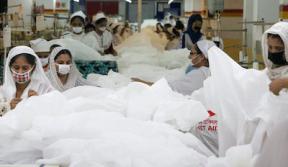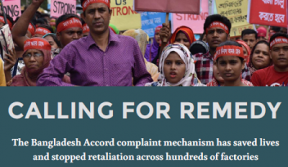On November 24, 2012, Tazreen Fashions, a clothing factory on the outskirts of Dhaka, Bangladesh, supplying global clothing brands was engulfed in flames.
One year after the fire, Clean Clothes Campaign and International Labor Rights Forum are still calling for immediate and urgent action by all brands associated with the Tazreen Fashions factory to:
- commit to working together with other brands and stakeholders to ensure full and fair compensation for all the victims of Tazreen fire, drawing onthe Arrangement established for Rana Plaza, and
- commit to making a fair financial contribution to the process and ensuring that a fund for full and fair compensation is fully financed.
Only C&A, Karl Rieker, El Corte Ingles and Li&Fung have signalled their intention to work with other stakeholders to develop a compensation framework for Tazreen victims.
To date only C&A has committed any substantial compensation and developed systems to ensure funds are distributed among the victims. Li & Fung has also made payments. While some brands linked to Tazreen have stated they will make voluntary contributions, no other brand has yet paid adequate amounts. These companies include: Delta Apparel (USA), Dickies (USA), Disney (USA), Edinburgh Woollen Mill (UK), El Corte Ingles (Spain), Enyce (USA), Karl Rieker (Germany), KiK (Germany), Piazza Italia (Italy), Sears (USA), Teddy Smith (France), and Walmart (USA).
Mirjam van Heugten of Clean Clothes Campaign says: “While brand executives lean back and dodge responsibility, survivors and families of the dead have lost their only source of income, and have high medical costs and injuries which prevent them from finding new work, including painful psychological scars. By taking no action or delaying payment of deserved compensation brands are condemning people to live in poverty and pain.”
Amirul Haque Amin, general secretary of the National Garment Workers Federation (NGWF) reports: “Some workers were thrown out of families because they cannot earn a wage anymore and are using expensive medication after the fire. It is a shame that brands make these people, who often have lost loved ones, stand on hold for 12 months.”
CCC and ILRF single out US retailer Walmart in particular for having taken no action even though the largest portion of the factory’s production was destined for Walmart. “As the largest retailer in the world, Walmart has a major responsibility to ensure the safety of the people that make their clothes. Their repeated claim of unauthorized sub-contracting is no excuse for abdicating responsibility. By taking no action at all to provide compensation to victims since the devastating Tazreen fire, Walmart has shown complete disregard for human life,” says Liana Foxvog from International Labor Rights Forum.
Some families of victims are facing the double injustice of having lost a family member and having officials deny their loved ones existence, as the struggle to identify the bodies continues, preventing them from accessing compensation.
While some payments have been made by the Bangladeshi government, clothing brand C&A, sourcing company Li & Fung and the Bangladesh Garment Manufacturers & Exporters Association (BGMEA), these payments fall desperately short of the money needed and the majority has been distributed inconsistently and with insufficient transparency.
Since the tragic collapse of Rana Plaza in April of this year, a method of calculation and distribution of compensation for loss of earnings and medical care is being developed by clothing brands and other key stakeholders known as the Arrangement, utilizing guidance set out by International Labour Organization Convention 121 on Employment Injury Benefits and building upon compensation models following earlier garment industry disasters in Bangladesh.

